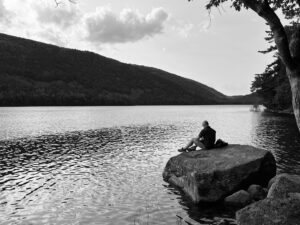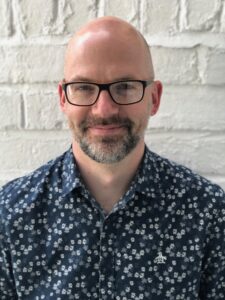We kicked off our series on the PhD journey and beyond, with a post from an English Literature PhD student, which offered a glimpse into a trip to an archive. This month, one of our Creative Writing PhD students, Alistair Daniel, shares his reflections on a very different form of research.
The customs officer flipped the pages of my passport and frowned. ‘What’s the purpose of your visit?’ he said.
I removed my fingers from the biometric scanner, leaving little crescents of sweat. I had not been looking forward to this question.
‘I’m doing research for a novel,’ I said.
The officer frowned. ‘Why?’ he said. ‘Can’t you just make it all up?’
Creative writing research has an image problem. While few people question the idea of research in other disciplines, in my experience, when you tell someone you’re doing creative writing research, they start to smile, visualising a pair of air quotes that hover over the word ‘research’ like a sceptical drone. If, when pressed as to the nature of this ‘research’, you admit that it involves spending five days in a bed and breakfast outside Hallowell, Maine, where you plan mostly to sit by a lake, the smile tends to broaden considerably. This is just a jolly, says the smile. You’re having a laugh.
Even if your trip doesn’t bear a suspicious resemblance to a holiday, the question still stands: what is creative writing field research for? After all, some writers don’t seem to need it. Shakespeare never went to Verona. And it’s amazing what can be gleaned nowadays from YouTube and Google Earth. Did I really need this field trip at all?
Montreal, the novel I was planning to research, is set not in Montreal but in a summer camp in central Maine where my protagonist, a hapless 19-year-old philosophy student called Simon Pritchard, has come to work in the kitchen. When not dicing carrots, Simon plans to spend his time transforming himself into a philosopher. To cut a medium-length story short, his plan goes tragically wrong.
Over the previous five years, I’d done the work of imagining Simon and his world – of making it all up – but that (I didn’t tell the customs officer) was partly why I needed to go: I needed to see how much of it was true. But there were other reasons as well. As a philosophy student, Simon is full of romantic Sartrean ideas about self-transformation. He finds an idyllic spot by a lake, a boulder hidden from the rest of the camp, and attempts to philosophise there, making phenomenological observations about his surroundings and noting them down. I needed to know what he would note. I needed to see what he saw. I needed to sit by a real Maine lake on a real Maine rock observing real Maine dragonflies, insects and birds, observing the kind of moss that grows on the Eastern Hemlock, touching the bark of an Eastern White Pine, hearing the unsettling cry of a loon, inhaling the stench of lake mud and Amber Solaire. I needed the sort of rich sensory detail that can’t be conjured by watching videos on YouTube.
Arriving in Boston I was excited, but anxious. Any writer knows that the timing of research, as much as the research itself, can be crucial. I’d originally applied for a grant in 2020, but Covid intervened. It intervened again in 2021 and by the time I was finally able to go, in the summer of 2022, my novel was almost complete. What if I’d got everything wrong? I was due to submit my PhD in three months’ time. How much would I really be prepared to rewrite at this stage? On the other hand, if it turned out I’d got everything right – that you can, in fact, make it all up – I would have wasted both my time and the university’s generous research grant. The trip would have looked – and felt – like a jolly.
In the end, I needn’t have worried. As I travelled around Maine, following in Simon’s footsteps, I soon realised how worthwhile it would be. Some things, I discovered, I’d got more or less right. There were plenty of rocks at the edges of lakes, many of them suitable for sunbathing and phenomenology. The loons really did sound insane. In this respect, the trip was good for my writerly confidence.
But I made fresh discoveries too. I drove the freeway Simon takes towards Canada – a road you can’t find on YouTube. I ate Maine dishes of the kind served at summer camps (popovers, whoopie pie). I walked out to Bar Island at low tide, a trip Simon takes with the kitchen crew. Two friends in Freeport showed me how to cook a lobster, which Simon does in a climactic scene at camp. I auditioned five different lakes and half a dozen rocks. None of them were exactly what I’d imagined, but between experience and imagination I worked up something that felt right.
And it was while sitting on those rocks that I had some entirely new ideas. I’d already pictured the movements of the dragonflies at the edge of Simon’s lake – after all, I’ve seen dragonflies elsewhere – but I hadn’t realised that Maine has so many kinds. And I discovered that they were hard to identify, even with a guidebook in hand. In previous drafts I hadn’t considered this. I’d imagined Simon buying an Audubon guide and painstakingly identifying each type. In practice, I realised, that would be hard. Dragonflies tend not to stay still, nor do they match the pictures in the book. Very little, in this world, matches the picture. I’d not considered this, or how a somewhat rigid and unimaginative boy like Simon might struggle to cope with the dragonflies’ refusal to conform to a neat taxonomical system. Or how this refusal, this resistance of the world to classification, perfectly suited a novel in which Simon continually pigeonholes other people, fitting them into his own taxonomical system, with fatal results. In this way, I came home with far more than 24,000 words of fresh description: I had new metaphors for the themes of the novel, and new ways of presenting character.
Next time, I’ll tell the customs officer.
Alistair Daniel is an Associate Lecturer in Creative Writing at the Open University, where he is completing a PhD in Creative Writing. He has an MA in Creative and Life Writing from Goldsmiths and has taught at the University of the Arts London and the University of East Anglia, where he held the Charles Pick Fellowship. His short stories have been published in magazines and journals including The Missouri Review, The Stinging Fly, Narrative, Litro, The Irish Times and Stand. He was shortlisted for the Bridport Prize in 2011 and 2020.


